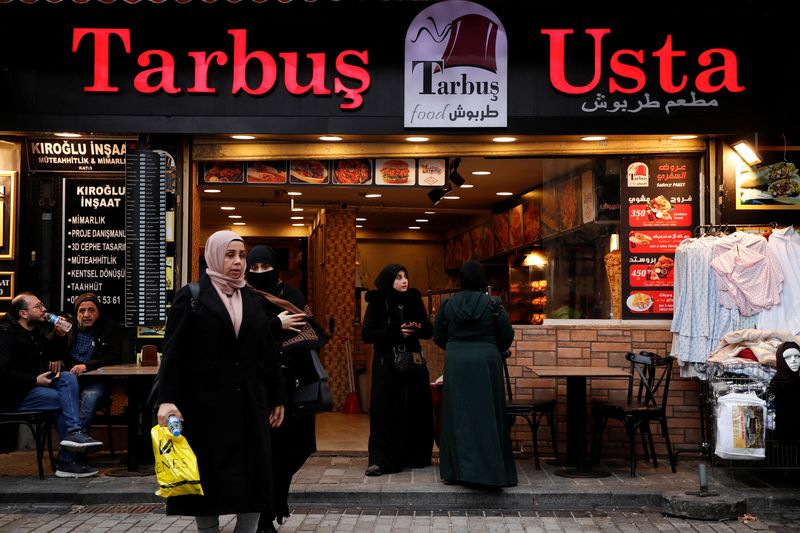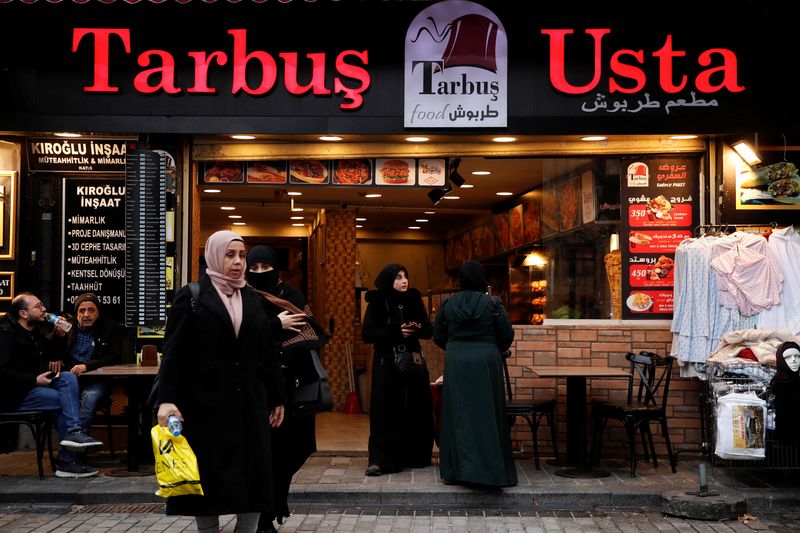Stock Markets
Rebels’ capture of Aleppo stirs Syrian homecoming hopes in Turkey

By Daren Butler and Birsen Altayli
ISTANBUL (Reuters) – Doctor Mehdi Davut smiles as he describes his planned return to his homeland Syria for the first time in eight years to see how his aid association can help in Aleppo, a major city seized by rebels last week.
“The liberation of Aleppo brought us such joy because Aleppo was a source of pain,” he told Reuters in Istanbul, where some half a million Syrians live.
Syrian rebels captured Aleppo from President Bashar al-Assad’s forces, bringing hopes of return among hundreds of thousands exiled from the city, which has been under Assad’s control since 2016. The rebels said on Thursday they had started a push further south into the city of Hama.
Hundreds of thousands have died in the Syrian war since it erupted out of a 2011 Arab Spring uprising against Assad’s rule. More than half the pre-war population of 23 million were forced from their homes, with millions fleeing abroad, including across the frontier to Turkey.
Many of those who settled learned Turkish, put their children in local schools and some acquired Turkish nationality, but they remained geographically close to their homeland, hoping they could someday return.
Turkish Interior Minister Ali Yerlikaya has said more than 40% of 3 million Syrians in Turkey are from Aleppo, once the country’s biggest city. But much of it was laid waste when Syrian forces backed by Russia and Iran besieged and took control of rebel-held areas eight years ago.
Davut, who runs an association helping Syrians in Turkey, was heading to Aleppo on Thursday to see what food and medical supplies are needed. But he was sceptical about the prospect of Syrians returning from Turkey any time soon.
“We are afraid of another attack,” he said, referring to military action by Assad-backed forces. “He will not give up that seat easily.”
“I think even those who want to return or those who think of returning will wait at least six months or a year,” he said.
SYRIANS TOLD TO WAIT
President Tayyip Erdogan had offered in July to meet Assad amid reconciliation efforts. He said at the time that 670,000 people had returned to Syria from Turkey and forecast another million would return.
But Yerlikaya advised caution. “Right now, to those (from Aleppo) who tell us ‘I want to go now’, we tell them to wait. Once the region is identified as safe, it will be announced,” he told reporters on Wednesday.
The situation in northwest Syria had stabilised since 2020 under a deal between NATO-member Turkey, which backs the political and armed opposition, and Russia, a key ally of Assad.
Ankara has said it gave no permission or support to the latest rebel operation but that Assad needed to reconcile with his people and the opposition. Moscow said it strongly backs efforts by Damascus to counter what it called terrorist groups receiving support from outside the country.
The head of Syria’s main opposition abroad, Hadi al-Bahra, told Reuters the rebel operation was meant in part to reopen Aleppo to those displaced on both sides of the border, including up to 600,000 from Turkey, if the city is stabilised.
The insurgents are a coalition of Turkey-backed mainstream secular armed groups but spearheaded by Hayat Tahrir al-Sham, or HTS, an Islamist group that has been designated a terrorist outfit by Turkey, the United States, Russia and other states.
Despite fears of instability, the news from Aleppo stirred excitement in the health clinic run by Davut in Istanbul’s Fatih district, with staff handing out sweets to celebrate.
“God willing, we can go to Aleppo as we are far from our family and beloved,” said nurse Intisar Ashour, 50, who left the city a decade ago. “It’s a joy from deep inside our hearts and I pray to go back.”
She left Aleppo with her brothers and sisters when one brother was killed in a barrel bombing, she said.
Elsewhere in Fatih, Syrian shopkeeper Mahir, 60, said all those he spoke to were happy about the news from Aleppo and some were thinking of going back.

But he was uneasy about what lay ahead, after spending a year in jail in Damascus.
“We have spent 50 years under the Assad regime, father then son. It’s horrible. You cannot imagine how Syrians suffered,” he said. “I hope those who are fighting now succeed. They will create for the new generation a new life, a new country.”
Stock Markets
US farm secretary says ‘no amnesty’ for farmworkers from deportation
Stock Markets
Chevron, JP Morgan lead market cap stock movers on Tuesday
Stock Markets
Tesla, Circle Internet Surge Among Monday’s Market Cap Stock Movers

 Forex3 years ago
Forex3 years agoForex Today: the dollar is gaining strength amid gloomy sentiment at the start of the Fed’s week

 Forex3 years ago
Forex3 years agoUnbiased review of Pocket Option broker

 Forex3 years ago
Forex3 years agoDollar to pound sterling exchange rate today: Pound plummeted to its lowest since 1985

 Forex3 years ago
Forex3 years agoHow is the Australian dollar doing today?

 Cryptocurrency3 years ago
Cryptocurrency3 years agoWhat happened in the crypto market – current events today

 World3 years ago
World3 years agoWhy are modern video games an art form?

 Commodities3 years ago
Commodities3 years agoCopper continues to fall in price on expectations of lower demand in China

 Economy3 years ago
Economy3 years agoCrude oil tankers double in price due to EU anti-Russian sanctions
































